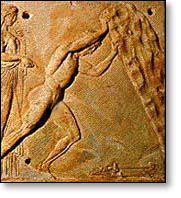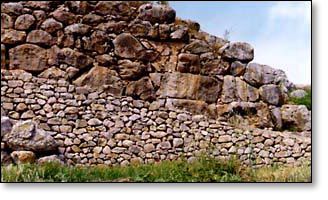Tartarus (TAR-tuh-rus). The Underworld zone of eternal torment, where the greatest sinners were punished for their transgressions. The worst of these offenders were deemed to be those who had sinned against the gods themselves. The greatest crime of all was to abuse the gods' hospitality. All the more so since to be on familiar terms with the great deities was a particular favor, reserved for the elect.
 Thus the hero Bellerophon was guilty of the greatest presumption when, in his later years, he dared to ride the winged horse Pegasus to the very gates of Olympus. Apparently he imagined that his heroic conquest of the Chimaera qualified him automatically for admission to the company of the gods. Zeus repaid this arrogance by sending a horsefly to sting Pegasus. The flying horse reared and Bellerophon was flung from its back, falling so far and landing so hard that he was crippled for life. He spent the remainder of his days a miserable, wandering outcast.
Thus the hero Bellerophon was guilty of the greatest presumption when, in his later years, he dared to ride the winged horse Pegasus to the very gates of Olympus. Apparently he imagined that his heroic conquest of the Chimaera qualified him automatically for admission to the company of the gods. Zeus repaid this arrogance by sending a horsefly to sting Pegasus. The flying horse reared and Bellerophon was flung from its back, falling so far and landing so hard that he was crippled for life. He spent the remainder of his days a miserable, wandering outcast.
 Tantalus, on the other hand, was invited to share not just Zeus's table but the great god's secrets. But Tantalus dared to tell these secrets to his fellow mortals. Or, some say, he stole Zeus's ambrosia. (Nectar and ambrosia were the special treats of the gods. Nectar was fermented honey, or mead. Ambrosia may have been a concoction of honey, water, fruit, cheese, olive oil and barley.) For either or both of his transgressions, Tantalus was consigned to Tartarus - as far beneath Hades as Hades is beneath the sky.
Tantalus, on the other hand, was invited to share not just Zeus's table but the great god's secrets. But Tantalus dared to tell these secrets to his fellow mortals. Or, some say, he stole Zeus's ambrosia. (Nectar and ambrosia were the special treats of the gods. Nectar was fermented honey, or mead. Ambrosia may have been a concoction of honey, water, fruit, cheese, olive oil and barley.) For either or both of his transgressions, Tantalus was consigned to Tartarus - as far beneath Hades as Hades is beneath the sky.
 The fifty daughters of Danaus murdered their husbands on their wedding night, driving daggers into their hearts and chopping off their heads. In fairness, they had not sought the marriages and were acting on their father's homicidal instructions. All the same, they were condemned in the afterlife to a perpetual labor of carrying water from the river Styx in jars - jars that leaked like sieves.
The fifty daughters of Danaus murdered their husbands on their wedding night, driving daggers into their hearts and chopping off their heads. In fairness, they had not sought the marriages and were acting on their father's homicidal instructions. All the same, they were condemned in the afterlife to a perpetual labor of carrying water from the river Styx in jars - jars that leaked like sieves.
 For throwing his father-in-law into a fiery pit, Ixion had to be purified by Zeus. Then he ungratefully tried to seduce the great god's wife. Hera warned her husband what was afoot, and Zeus fashioned a cloud into Hera's likeness. Ixion made a pass at the cloud and was caught in the act. In punishment, he spends eternity in the lowest level of the Underworld, chained to a fiery wheel.
For throwing his father-in-law into a fiery pit, Ixion had to be purified by Zeus. Then he ungratefully tried to seduce the great god's wife. Hera warned her husband what was afoot, and Zeus fashioned a cloud into Hera's likeness. Ixion made a pass at the cloud and was caught in the act. In punishment, he spends eternity in the lowest level of the Underworld, chained to a fiery wheel.
|
| Thebes (theebz). Greek city, ruled in myth by Oedipus. Thebes was founded by Cadmus, who had consulted the Delphic Oracle while searching for his missing sister. The Oracle told Cadmus to abandon his search and follow the nearest cow instead. Wherever the cow lay down, he was to found a new city. There was another famous Thebes in Egypt.
|
| | Thera (THEE-ruh). Volcanic Aegean island which erupted disastrously during the time of the Minoan civilization of Crete. Once the volcano had been purged of its molten core, the hollow cone collapsed. The sea rushed in, rebounded when it hit bottom and then recoiled in a tidal wave that impacted the coastal settlements of Crete. This may account for the legend of Atlantis sinking beneath the sea.
| |
| | |





